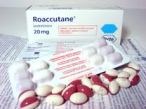Something I see occasionally in my clinic is clients with spots. And it’s not usually teenagers, it’s more likely to be women in their 30s and 40s. I’ve even had one lady in her 60s who suffered from cystic acne on her chin, not bad enough for a dermatology referral, but none the less, unpleasant to put up with. My clients have usually been suffering for years, and while their GP or dermatologist may be sympathetic, the prescribed treatments offered have not provided a long term solution.
As an acne suffer myself from the age of 14, I spent 20 years wondering when I’d  ‘grow out’ of it. Every medication in the BNF (the doctor’s prescribing bible) has been given to me, from benzyl peroxide cream to the liver toxic Roaccutane. Each would help for a while, but the spots always returned. It was evident that the root cause was not being treated. I was always told by GPs, dermatologists and even dietitian colleagues that there was no relationship between acne and diet.
‘grow out’ of it. Every medication in the BNF (the doctor’s prescribing bible) has been given to me, from benzyl peroxide cream to the liver toxic Roaccutane. Each would help for a while, but the spots always returned. It was evident that the root cause was not being treated. I was always told by GPs, dermatologists and even dietitian colleagues that there was no relationship between acne and diet.
What does the research show? The outdated opinion that acne is not related to diet comes from a 1969 study looking at the effect of chocolate on acne, in which the inappropriate conclusion was drawn that, as chocolate did not appear to affect acne, neither did any dietary factor. However, there is growing evidence from more recent studies supporting the relationship between diet and acne. In particular a high glycaemic index diet and dairy have been implicated. There is also emerging medical evidence and a growing number of clinicians acknowledging that up to 10% of the population may have a gluten intolerance, despite testing negative for coeliac disease. Gluten intolerance can manifest in skin conditions. There is also interesting new research looking at gut bacteria, and it’s role in inflammation and immunity.
What causes acne? Acne is caused by a combination of hormones and inflammation. Women with polycystic ovary syndrome are particularly susceptible. A diet high in refined carbohydrates (sugar, white bread, white rice, biscuits, sweets, pastries etc.), low in fruit and vegetables, and low in essential fatty acids may have a negative effect on hormones, and may also contribute to inflammation. This is where the role of good/bad bacteria in the gut becomes interesting. A poor diet affects the complex flora in the digestive tract resulting in an overgrowth of the bad, which may ultimately have many effects outside of the gut, including spotty skin.
For years, I have followed a very healthy diet including lots of veg, fruit, whole grains, healthy fats, low sugar etc. however, still suffered with acne. In desperation, 2 years ago I thought I would have nothing to lose by trying a gluten free diet. With in a few weeks the spots had cleared. The ‘gold standard’ way to challenge the intolerance is to reintroduce the food. I have done this twice, once on holiday in Morocco where breakfast was almost completely bread products, and in Ireland where I wasn’t going to offend my husband’s Granny by turning down her scones! The result? With in about 3 days I had horrible spots which took about a month each time to clear up.
challenge the intolerance is to reintroduce the food. I have done this twice, once on holiday in Morocco where breakfast was almost completely bread products, and in Ireland where I wasn’t going to offend my husband’s Granny by turning down her scones! The result? With in about 3 days I had horrible spots which took about a month each time to clear up.
Everyone is different and there is no magical ‘one diet fits all’. For me, gluten is my trigger, however, this will not be the case for all. For some of my clients, just cutting out the refined carbs and increasing the good fats is enough to see  improvements. A change in diet can take time to show in the skin. Some people see a difference in a few days, for some it may take a few months.
improvements. A change in diet can take time to show in the skin. Some people see a difference in a few days, for some it may take a few months.
My recommendations:
- avoid refined carbohydrates, change to wholegrains
- have a good intake of vegetables and fruit (at least 5 portions a day)
- take a daily fish oil supplement containing 500mg DHA & EPA
- include healthy fats e.g. nuts and seeds, olive oil, avocados
- consider a trial exclusion of dairy
- consider a trial exclusion of gluten
- consider a probiotic supplement
If you don’t feel confident with changing your diet or choosing a probiotic, seek the advice of a dietitian to guide you. Cutting out food groups such as dairy, can leave you lacking in important nutrients. A dietitian can also help you with the practical aspects of applying the recommendations to your current diet and lifestyle. For example, what to buy in Pret a Manger or Starbucks, how to incorporate more veg, how to go gluten free.

